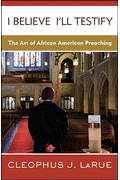Cleophus LaRue: I Believe I’ll Testify
 Cleophus J. LaRue, I Believe I’ll Testify: The Art of African American Preaching (Louisville, KY: Westminster John Knox, 2011), 160 pages, ISBN 9780664236779.
Cleophus J. LaRue, I Believe I’ll Testify: The Art of African American Preaching (Louisville, KY: Westminster John Knox, 2011), 160 pages, ISBN 9780664236779.
In American black churches the most important qualification for the pastor is the ability to preach, according to author Cleophus J. LaRue (p. 57). This skill, he says, has remained important to black church attendees since the days of slavery and, therefore, its art and practice have not suffered neglect nor lost appeal over the years.
After several years in the pastorate, the author now teaches homiletics at Princeton Theological Seminary. Twice in the preface, he refers to the chapters of this book as essays, several of which were previously published in other venues. He reports blacks still possess a healthy sense that God is for them and believe black preaching should bolster that opinion. Black preachers, consequently, take God’s Word seriously given that it serves as a primary source of their spirituality.
In contrast to white preaching, LaRue quotes an Indian scholar who contents, “American homileticians (i.e., white) [have] tended to focus too much on the how-tos of preaching and not enough on the whys and wherefores” (p. 37).
The volume begins with a brief history of the author’s childhood in the black church, his call to preach, his choice to leave the pastorate to attend seminary, and his professorship at Princeton. He notes the differences between black and white preaching and the irrelevance of Craddock’s inductive approach for black congregations. LaRue describes for his readers the various levels of expectations black congregations have of the sermon. He maintains blacks learn to preach more from listening to respected black preachers than professors who lecture on the subject. He asserts that black preaching tends to address five domains of experience: personal piety, spiritual disciplines, social injustice, cooperate concerns (for blacks only), and church maintenance (p. 65). Also in the book, he explains his own personal sequence of sermon preparation.
LaRue quotes several prominent black homileticians who list the major characteristics of black preaching as a whole. Interaction frequently occurs with various other authors and includes bibliographical information for those homileticians who would like to consult these resources at their own leisure. After making the observation, “Christianity is turning brown and moving south” (p. 47), he cites a prediction that the majority of Christians in the foreseeable future will be located in southeast Asia, Latin American, and Africa. This forecast serves as the background for his reference to ‘colored’ preaching, in addition to black preaching.
This reviewer has no objections to any of the contents in this volume. The author takes a balanced approach to his subject and is fair in his appraisal of white preaching. He rightfully believes both blacks and whites can learn from each other and helpfully lists seven ways to improve one’s preaching: 1) by listening to good preachers, 2) by studying preaching, 3) by desiring to improve, 4) by absorbing the Scriptures, 5) by focusing on the needs of people, 6) by understanding the different ways people listen, and 7) by improving one’s insight into human nature (pp. 124-33).
Pentecostals will appreciate the black emphasis on the belief in and contact with the spiritual world, including miracles and healings. This book explains why blacks flocked to Baptist and Methodist churches after the Revolutionary War—these churches allowed blacks to participate in them—and how the black church has a huge influence over black culture with its preachers in the lead—it is the one organization blacks fully control. Members of black churches rightfully take the position, “The person who stands to preach is not there because it is his or her turn. Rather, preachers stand to preach because it is their time—a time that has been set and ordered by God” (emphasis his, p. 64).
Category: Ministry, Pneuma Review, Winter 2014


